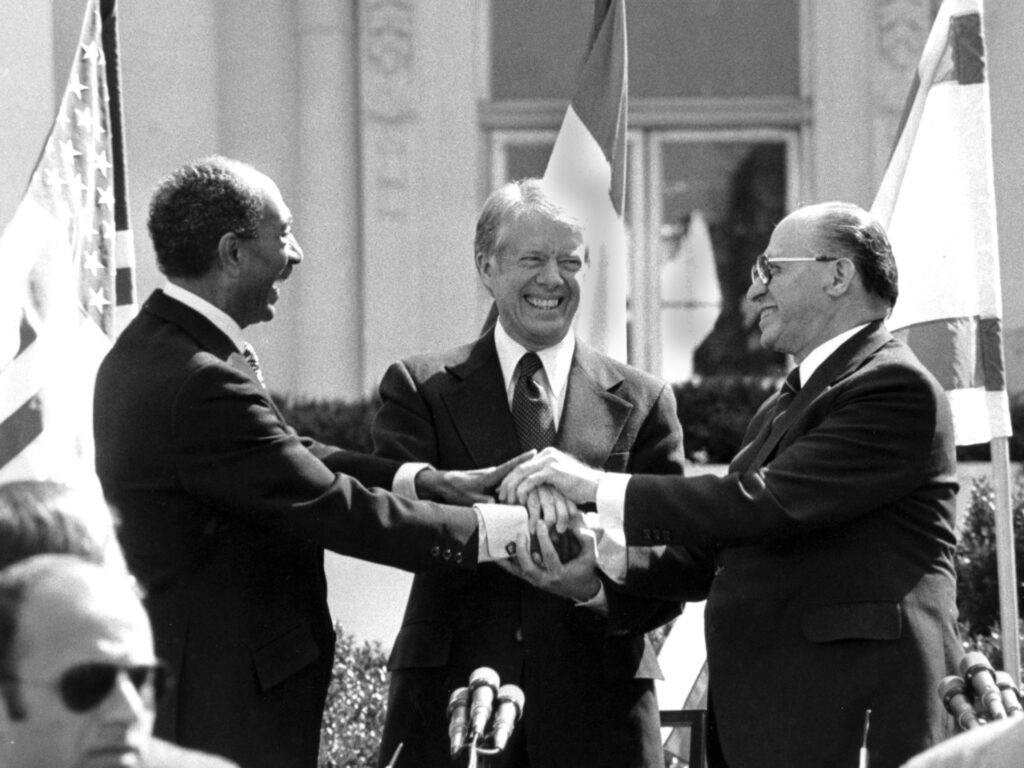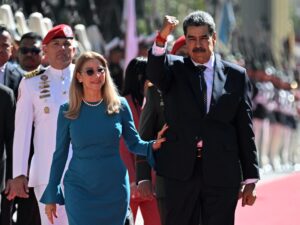
On December 29, former President Jimmy Carter passed away at the age of 100. As the 39th president of the United States and as a private citizen, Carter was an advocate for peace between nations, democracy and various humanitarian and environmental causes. But in the Middle East, he is going to be remembered as the father of Arab-Israeli normalisation.
Sworn in as president in 1977, Carter was given the opportunity by Egyptian President Anwar Sadat to be the architect of the first normalisation deal between an Arab country and the Zionist state. He helped Sadat and Israeli Prime Minister Menachem Begin conclude the 1978 Camp David Accords and negotiate the 1979 Egyptian-Israeli peace treaty that formally ended the conflict between the two countries.
As developments in the past four decades have shown, neither the accords nor the treaty led to peace and justice in the Middle East. Israel continues its occupation of the West Bank and East Jerusalem and has launched a genocidal war on the Gaza Strip; the Palestinians still do not have an independent state with Jerusalem as its capital; and an overwhelming majority of the Arab public refuses to recognise Israel or agree to normalising relations with it.
Advertisement
Looking back at the accords Carter brokered, it is clear that they were the beginning of the slow and gradual, although not publicly acknowledged, abandonment of the Palestinian cause by Arab officialdom, and a US campaign to bury Palestinian national aspirations.
The legacy of Camp David
The Camp David Accords were first and foremost a roadmap towards a full Egyptian-Israeli peace, full recognition of Israel by Egypt, and an end to Egypt’s participation in the Arab economic boycott of Israel. To be sure, the accords were a mere framework for negotiations between the two countries that would lead a few months later to the signing of a peace treaty.
But they also included provisions related to the Palestinian people, whose wording was indicative of the ultimate purpose of the accords. The document spoke of a plan to provide “autonomy” to the “inhabitants” of the occupied territory, as if the Palestinians were aliens squatting in the West Bank and Gaza.
At the time, the US had not yet recognised the Palestine Liberation Organization (PLO) as the sole legitimate representative of the Palestinian people. Thus, the accords called for electing a “self-governing authority” for the occupied territory. But that autonomy and the elected authority were to be supervised by Israel, Egypt, and Jordan, in obvious violation of the Palestinians’ right to constitute an independent, national government.
Throughout the 1980s, and because of US-supported Israeli objections, the Palestinians were absent and prevented from playing a role in devising peace plans for the Arab-Israeli and Palestine-Israel conflict. But the eruption of the first Intifada in December of 1987 and Jordan’s 1988 relinquishing of its claim to the West Bank made it clear that the Palestinians could no longer be ignored in peace negotiations.
Advertisement
Still, in 1991, the Palestinians participating in the Madrid Conference were only present as part of a Jordanian delegation, once again denying their nationhood.
Like other iterations of the US-led and sponsored “peace process”, the Madrid path led to a stalemate, as Israel continued to ignore the Palestinians’ national rights and reject any talk of ending its occupation. Following the Israeli elections in 1992 that brought the Labor Party to power, the US shepherded the Oslo Accords between the PLO and Israel that created the Palestinian National Authority (PA). As a constituted government for the Palestinians, the PA was required to recognise Israel’s right to exist before securing official Israeli acknowledgement of Palestinian grievances and national aspirations.
Jordan, for its part, had to sign a peace treaty with Israel, becoming the second Arab state after Egypt to recognise the Zionist state. All Amman was able to preserve from its relationship with Palestine was its custodianship of religious sites in Jerusalem, a status that is constantly challenged by the Israeli authorities today.
The Abraham Accords
Throughout the so-called “peace process” that the Camp David Accords set in motion, the US was keen to encourage Arab states to consider their interests separately from those of the Palestinians. This encouragement became a full-fledged campaign during the presidency of Donald Trump who, along with his administration lieutenants, evinced more than the usual American bias in favour of the Zionist state.
Advertisement
In 2020, Trump presided over the signing of the so-called Abraham Accords that normalised relations between Israel and the United Arab Emirates, Bahrain, and Morocco. Sudan joined the following year.
While all Arab states involved insisted that the normalisation of relations with Israel would help improve the lives of Palestinians and should not be seen as abandoning them, the truth was they all got something in return for recognising Israel with no regard for Palestinian interests.
The UAE’s normalisation with Israel appears to be the fastest and deepest. The two countries have quickly developed and expanded military and economic relations. Bahrain aimed to use its relations with Israel as a hedge against an aggressive Iran. Morocco received a much-desired US recognition of its sovereignty over the Western Sahara. And Sudan was able to get itself removed from the US list of state sponsors of terrorism.
To be sure, the Abraham Accords were no more than transactions that advanced the signers’ interests at the expense of the Palestinian cause, thus allowing Israel to deepen its apartheid policies and entrench its occupation of Palestinian land.
And it is not difficult to see a strong desire in the upcoming Trump administration for an expanded map of Arab normalisation with Israel, one that includes Saudi Arabia, for example. As was the case with earlier normalisation deals, the Palestinians will be the last to count on any dividends from more Arab openness on Israel.
A welcome change of heart
After the end of his presidential term, Carter continued to pursue efforts for peace between Palestinians and Israelis. But the more he observed the situation on the ground, the more he became convinced that the US policy of steadfast support for Israel was wrong and counterproductive.
Advertisement
Thus in 2007, he published a book titled Palestine: Peace Not Apartheid in which he declared that Israeli policies in the occupied Palestinian territories amounted to the crime of apartheid. This was a welcome change of heart from a long-held conviction among many US politicians and opinion-makers. Carter remains the only prominent US politician brave enough to call Israeli policies and practices by their proper name.
As Americans mourn his death and remember his legacy, it is important to reflect on the disastrous US policies in Palestine. Over the past four decades, Israel’s occupation has grown more and more violent thanks in large part to unconditional US support.
It is time for Washington to revise its stance on Israel-Palestine. A reversal in US policy on Palestine – one that recognises Palestinian rights and holds Israel accountable for its crimes – is something Jimmy Carter likely would have wanted to see in his lifetime.
The views expressed in this article are the author’s own and do not necessarily reflect Al Jazeera’s editorial stance.











More Stories
Venezuela’s Nicolas Maduro sworn in for third term after disputed election
Italy foreign minister meets Syria’s new rulers, calls for sanctions talks
Trump sentenced in New York hush-money case days before taking office